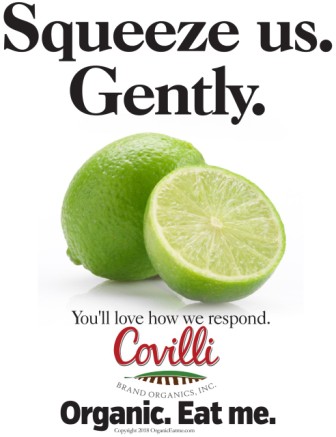Dennis Weaver is the co-founder and president of the Organic Marketing Association, a non-profit that growers CANNOT pay to join. The consumer-facing OMA celebrates the fun side of organics by building awareness with slogans, puns and Instagram-inspired illustrations of vegetables like celery with the headline “Stalking You” or lemons calling you to “Pucker Up Baby.”
I

Organic’s Market Share Has Plateaued
Organic Marketing Association President Dennis Weaver explains that organic food is delicious and nutritious, “So why is organic stuck at 5% market share with plantings on only 1% of US acreage?” he asks. One reason is that organic suppliers spend too much time talking about what’s not organic, he explains. They are in a defensive bubble, he says. Consumers are far more interested in how tasty, fun and easy it is to choose organics.
Dan Bolton: Sales of organic foods and beverages are steady with broad distribution in the US, but growth plateaued in the 15 years since organic foods first became available at mainstream grocers. How did OMA come about?

Dennis Weaver: A group of us from a wide range of backgrounds happen to believe that organic good food is the best for you, me and the planet and that more people ought to be enjoying the wholesome, healthful benefits of organic good foods and so we’ve created the Organic Marketing Association to do just that to inspire you.
The Organic Marketing Association is a new, fresh bold, high-energy nonprofit designed to present organics in positive ways. We’re flipping the script to the fun, delicious, and entertaining side. We won’t try to educate anyone. Instead, we’ll focus on making positive associations with the word organic and the things that make people happy.
It’s a simple formula that works. It’s called the Law of Attraction.
The law of attraction states that people are more apt to move towards what they want rather than avoid. We’re walking away from the tired organic narrative that was negative, argumentative, disparaging.
“We won’t try to educate anyone. Instead, we’ll focus on making positive associations with the word organic and the things that make people happy. It’s a simple formula that works,” says Weaver.
Dan: Describe OMA’s newly launched website and how it breaks free of the conventional paradigms for marketing organics.
Dennis: The website is full of color and fun and smiles and people living life to its fullest, a presentation of organic that’s always on the positive. Lot’s of fun stuff to see, read, do and buy and it’s real easy for brands, retailers, distributors, brokers, manufacturers, influencers, sponsors, allies and farms to get in where they fit in and join the fun ‘good works’ of driving the healthy and delicious Organic Good Food and Beverage Market Share forward for the good health of people and planet.
You can buy boosted Facebook ads. The most important thing is the engagement rate. In 2019 the average engagement for food and beverage was 0.12%, for all industries it is 0.09%. Why? They’re not very fun.

Our taglines and headlines cause a smile if not “out loud” laughter, cause conversational comments and lots of personal shares with their friends. Because we load in fun and happiness, our average engagement rate is 13.5%! We claim we’re 13,166% funnier than anybody else. Proof fun wins! That engagement rate is where the money is and so we’ve refined that skill.
Organic Good Food is the life of the party and we’re bringing the party to their house! Organic Good Foods are the healthy high!
And way back in 1944, songwriter Johnny Mercer got it right in his song “Ac-Cent-Tchu-Ate the Positive”!
Dan: How can OMA benefit the organic segment of the global tea industry?
Dennis: The most important ingredient in tea is the workers and farmers. Farmers can participate in the Organic Marketing Association for free, because without the organic farmers, we’ve got nothing you can buy.
All of our organic good food, farm health, and beauty fabric friends benefit by the Organic Marketing Association positioning their organic good food, tea, wholesome fun, delicious over-the-top taste. It’s designed to encourage people to make the organic good food choice for their own good health.
We tell your story singing a song and with product and storyline placements, put your organic tea in their hands, mind, and mouth.
Join the fun.
Revised|Updated DWB May 3, 2021

Flipping the Script
The Organic industry has struggled to speak outside of the Organic bubble—spending way too much time focusing on what’s not in Organic when the mainstream consumers care a lot more about how tasty, fun, and easy products are and how cool the brands will make them look. So the Organic Marketing Association is flipping the script. Instead of continuing the 5% narrative, we speak to and pursue the 95%.

”If you want to introduce the mainstream consumer to the fun side of Organic while building awareness for great Organic brands…”
Join the Organic Marketing Association
Share this post with your colleagues
Signup and receive Tea Biz weekly in your inbox.
Never miss an episode
Subscribe wherever you enjoy podcasts:


